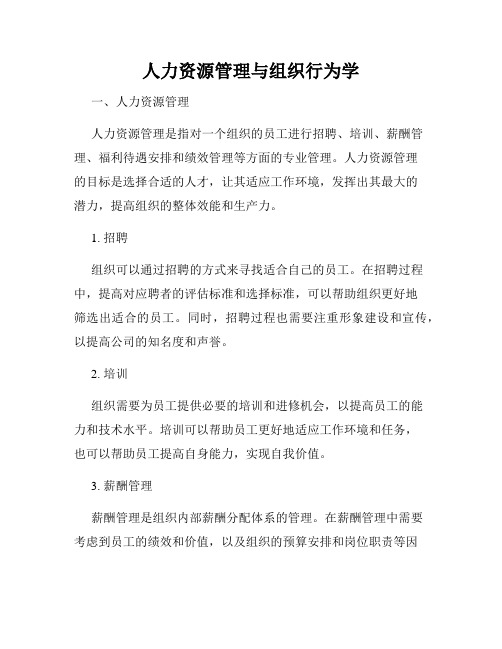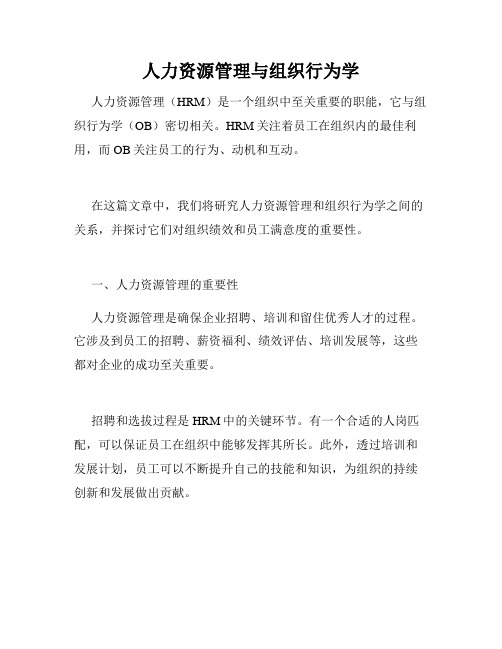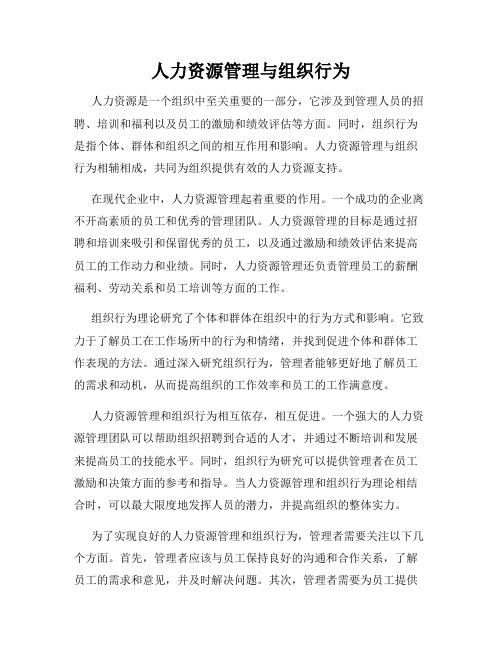人力资源管理与组织行为_报告
人力资源管理与组织行为学

人力资源管理与组织行为学人力资源管理(Human Resource Management,HRM)是指以人为中心的管理思想和方法,通过合理配置、开发和激励员工,以实现组织目标的一种管理活动。
而组织行为学(Organizational Behavior,OB)是研究人类行为在组织中的规律和特点,以及影响人类行为的各种因素的学科。
本文将探讨人力资源管理与组织行为学之间的关系,并重点讨论在实践中如何运用组织行为学理论来提升人力资源管理的效果。
一、人力资源管理的重要性及作用人力资源是组织中最重要的资产之一,对于企业的发展和竞争力具有重要影响。
人力资源管理不仅涉及到员工的招聘、培训、绩效评估等方面,更重要的是在塑造组织文化、建立良好的员工关系、提高员工满意度等方面起到核心作用。
通过合理的人力资源管理,企业可以减少员工离职率,提高员工忠诚度和工作效率,从而提升组织的绩效和竞争力。
二、组织行为学在人力资源管理中的应用1. 招聘与录用在招聘与录用过程中,组织行为学可以帮助企业分析候选人的心理特点和行为习惯,通过科学的招聘面试和心理测试等方式,选出最适合组织的人才。
例如,通过分析候选人的个性特征和团队合作能力,可以提前预测其适应性和工作表现。
2. 培训与发展在员工培训与发展中,组织行为学可以帮助企业制定有效的培训计划和方法。
例如,了解员工学习风格和动机,可以选择适合他们的培训方式,提高培训的效果。
同时,组织行为学还可以帮助企业识别和培养潜在的领导者,提升组织的领导力水平。
3. 绩效管理组织行为学可以为绩效管理提供科学的评估指标和方法。
通过了解员工的工作动机和能力,以及识别目标与绩效之间的关联性,能够更加准确地评估员工的工作表现,并为员工提供个性化的激励措施。
此外,组织行为学还可以帮助企业建立公平的绩效评估制度,减少主观因素的干扰。
4. 员工关系管理组织行为学可以提供一系列方法和理论,帮助企业理解和管理员工的情绪、行为和动机。
组织行为与人力资源管理

组织行为与人力资源管理引言:组织行为是一门研究员工在组织内的行为模式和互动的学科,人力资源管理则是指组织在招聘、培训、激励、评估和离职等方面的管理。
本文将从以下几个方面详细探讨组织行为与人力资源管理的关系以及在实际工作中的应用。
一、组织行为的概念和理论1. 组织行为的定义:组织行为是研究员工在组织内如何行动,如何互动的学科,关注员工的心理过程、行为和团队动力等方面。
2. 组织行为的理论:包括马斯洛的需求层次理论、赫茨伯格的双因素理论、赫氏认知一致理论等,在实际工作中可应用于员工激励、心理需求满足以及员工行为预测等方面。
二、人力资源管理的概念和职能1. 人力资源管理的定义:人力资源管理是指组织通过招聘、员工培训、激励、绩效评估和离职等方式,有效地管理和利用人力资源,以达成组织的目标。
2. 人力资源管理的职能:包括人力资源规划、招聘与录用、培训与发展、绩效管理、薪酬福利、员工关系管理等方面,通过合理的人力资源管理,提高组织的绩效和竞争力。
三、组织行为与人力资源管理的关系1. 影响因素:组织的文化、领导风格、员工的需求和动机等因素会对组织行为和人力资源管理产生影响。
2. 相互作用:组织行为与人力资源管理相互影响,良好的组织行为有助于人力资源管理的顺利进行,而有效的人力资源管理也能促进组织行为的积极发展。
四、人力资源管理在组织行为中的应用1. 招聘与录用:根据组织的需求和员工的能力要求,通过将组织行为与招聘标准相结合,选拔合适的员工加入组织。
2. 培训与发展:通过培训与发展计划,提高员工的专业技能和组织行为能力,为组织的发展提供人才支持。
3. 绩效管理:设定合理的绩效管理指标,对员工的工作表现进行评估和激励,促进良好的组织行为。
4. 薪酬福利:合理的薪酬福利制度可以激励员工的积极性,增强他们的归属感和满意度,从而促进组织行为的发展。
5. 员工关系管理:通过建立良好的员工关系,增强员工之间的合作和互信,营造积极的组织文化和氛围,推动组织行为的积极发展。
人力资源管理与组织行为学

人力资源管理与组织行为学一、人力资源管理人力资源管理是指对一个组织的员工进行招聘、培训、薪酬管理、福利待遇安排和绩效管理等方面的专业管理。
人力资源管理的目标是选择合适的人才,让其适应工作环境,发挥出其最大的潜力,提高组织的整体效能和生产力。
1. 招聘组织可以通过招聘的方式来寻找适合自己的员工。
在招聘过程中,提高对应聘者的评估标准和选择标准,可以帮助组织更好地筛选出适合的员工。
同时,招聘过程也需要注重形象建设和宣传,以提高公司的知名度和声誉。
2. 培训组织需要为员工提供必要的培训和进修机会,以提高员工的能力和技术水平。
培训可以帮助员工更好地适应工作环境和任务,也可以帮助员工提高自身能力,实现自我价值。
3. 薪酬管理薪酬管理是组织内部薪酬分配体系的管理。
在薪酬管理中需要考虑到员工的绩效和价值,以及组织的预算安排和岗位职责等因素。
适当地通过激励措施,可以让员工更好地投入工作,提高组织的整体效能。
4. 福利待遇组织需要为员工提供必要的福利待遇,以提高员工的满意度和忠诚度。
福利待遇包括社保、奖金、休假、住房等方面,可以让员工更好地安心工作,进而提高组织的整体效应。
5. 绩效管理绩效管理是指对员工的工作表现进行综合评价,以及通过绩效评价结果对员工进行奖惩和调整。
组织需要建立绩效评价体系,以便更好地评估员工的工作表现,并针对性地为员工提供必要的培训和激励。
二、组织行为学组织行为学是对员工在工作组织中的行为和心理状态进行研究的学科。
组织行为学研究员工在工作中的动机、行为模式、意见和决策等因素,研究员工行为与组织效能的联系,以及如何利用行为学知识来提高组织效能。
1. 动机员工的动机是驱动员工投入工作的因素。
了解员工动机和识别员工的需求可以帮助组织更好地进行员工管理。
组织可以通过激励措施、奖励和培训等方式来提高员工的动机水平,以进一步提高员工的投入和效率。
2. 行为模式员工在工作中的行为模式直接关系到组织的效能。
组织需要在行为模式上进行合理引导,提供必要的培训和指导。
人力资源管理与组织行为学

人力资源管理与组织行为学人力资源管理(HRM)是一个组织中至关重要的职能,它与组织行为学(OB)密切相关。
HRM关注着员工在组织内的最佳利用,而OB关注员工的行为、动机和互动。
在这篇文章中,我们将研究人力资源管理和组织行为学之间的关系,并探讨它们对组织绩效和员工满意度的重要性。
一、人力资源管理的重要性人力资源管理是确保企业招聘、培训和留住优秀人才的过程。
它涉及到员工的招聘、薪资福利、绩效评估、培训发展等,这些都对企业的成功至关重要。
招聘和选拔过程是HRM中的关键环节。
有一个合适的人岗匹配,可以保证员工在组织中能够发挥其所长。
此外,透过培训和发展计划,员工可以不断提升自己的技能和知识,为组织的持续创新和发展做出贡献。
HRM还涉及到绩效评估和薪酬管理。
通过设定明确的目标和评估标准,可以确保员工的工作绩效能够得到评估和激励。
合理的薪资福利制度也能够提高员工的满意度和忠诚度。
总之,人力资源管理是确保企业拥有高素质、高效能员工团队的关键因素。
二、组织行为学的重要性组织行为学是研究个体和组织之间互动的学科。
它主要关注员工如何与组织的结构、文化和环境相互作用。
在组织行为学中,重要的主题包括员工的动机、满意度、领导力和团队合作。
理解这些主题可以帮助组织更好地管理和激励员工,提升员工的工作绩效和满意度。
关于员工动机,组织行为学研究不同的动机理论和方法,包括金钱激励、工作设计和员工参与等。
通过了解员工的动机来源和需求,组织可以设计出更好的激励机制,促使员工发挥更好的工作表现。
组织行为学还研究员工的满意度和忠诚度。
了解员工的满意度水平,可以帮助组织识别问题和改进不足之处。
只有员工对组织有高度的满意度和忠诚度,才能够持续地为组织创造价值。
最后,领导力和团队合作是组织行为学中的重要主题。
领导力对于组织内的协调和决策至关重要。
团队合作可以促进知识和经验的共享,提高组织的创新能力和应变能力。
三、人力资源管理和组织行为学的关系人力资源管理和组织行为学是相互关联的学科。
人力资源管理与组织行为学

人力资源管理与组织行为学人力资源管理(Human Resource Management,简称HRM)和组织行为学(Organizational Behavior,简称OB)是现代组织管理中的两个重要领域。
本文将系统地探讨这两个领域的关系及其对组织运作的重要性。
一、人力资源管理的定义和作用人力资源管理是一种管理理念和方法,它关注的是如何通过有效的人力资源的配置、开发和激励,使组织能够实现其战略目标。
人力资源管理的目标包括招聘与选择、培训与开发、绩效管理、薪酬与福利、员工关系管理等方面。
人力资源管理的作用在于提供组织所需的各类人力资源,以满足组织的业务需求,并确保员工能够发挥最大的效能。
同时,人力资源管理也关注维护员工的利益,增强员工对组织的认同感和归属感,从而提高员工的工作积极性和创造力。
二、组织行为学的定义和作用组织行为学是研究个体、群体和组织在工作环境中的行为的学科。
它研究员工在组织中的态度、价值观、动机、情感等因素对工作绩效和组织效能的影响。
组织行为学旨在帮助组织管理者更好地了解员工的需求和行为规律,为他们提供有针对性的管理策略和方法。
通过了解员工的行为,组织可以更好地激励员工,提高员工的工作满意度,增强团队的凝聚力和协作能力,从而提升整个组织的绩效。
三、人力资源管理与组织行为学的关系人力资源管理与组织行为学密不可分,二者相互依存、相互促进。
人力资源管理需要依托组织行为学的理论和方法,全面了解和应对员工的行为特点和需求;而组织行为学也需要借助人力资源管理的实践,使其理论和研究成果能够应用于实际组织中。
人力资源管理与组织行为学的关系主要表现在以下几个方面:1. 招聘与选择:人力资源管理通过组织行为学的研究成果,确定岗位需求和招聘标准,以及招聘渠道和面试方法,从而确保招聘到合适的员工。
2. 培训与开发:人力资源管理依托组织行为学的理论和方法,设计和提供员工培训和发展计划,帮助员工提升职业能力和工作技能。
人力资源管理与组织行为

人力资源管理与组织行为人力资源是一个组织中至关重要的一部分,它涉及到管理人员的招聘、培训和福利以及员工的激励和绩效评估等方面。
同时,组织行为是指个体、群体和组织之间的相互作用和影响。
人力资源管理与组织行为相辅相成,共同为组织提供有效的人力资源支持。
在现代企业中,人力资源管理起着重要的作用。
一个成功的企业离不开高素质的员工和优秀的管理团队。
人力资源管理的目标是通过招聘和培训来吸引和保留优秀的员工,以及通过激励和绩效评估来提高员工的工作动力和业绩。
同时,人力资源管理还负责管理员工的薪酬福利、劳动关系和员工培训等方面的工作。
组织行为理论研究了个体和群体在组织中的行为方式和影响。
它致力于了解员工在工作场所中的行为和情绪,并找到促进个体和群体工作表现的方法。
通过深入研究组织行为,管理者能够更好地了解员工的需求和动机,从而提高组织的工作效率和员工的工作满意度。
人力资源管理和组织行为相互依存,相互促进。
一个强大的人力资源管理团队可以帮助组织招聘到合适的人才,并通过不断培训和发展来提高员工的技能水平。
同时,组织行为研究可以提供管理者在员工激励和决策方面的参考和指导。
当人力资源管理和组织行为理论相结合时,可以最大限度地发挥人员的潜力,并提高组织的整体实力。
为了实现良好的人力资源管理和组织行为,管理者需要关注以下几个方面。
首先,管理者应该与员工保持良好的沟通和合作关系,了解员工的需求和意见,并及时解决问题。
其次,管理者需要为员工提供良好的工作环境和福利待遇,以提高员工的工作满意度和忠诚度。
此外,管理者还需要通过培训和发展来提高员工的技能水平和专业素养。
最后,管理者应该制定有效的激励机制,以促使员工积极工作并取得良好的绩效。
综上所述,人力资源管理与组织行为是现代企业管理中不可或缺的一部分。
通过科学的人力资源管理和深入的组织行为研究,管理者可以更好地了解员工需求,并提供良好的工作环境和激励机制,从而实现组织的长期发展目标。
组织行为与人力资源管理
组织行为与人力资源管理组织是由一群人汇聚在一起、共同实现目标的社会群体。
组织行为学将组织视为一个动态的系统,它的行为与互动是一个社会、心理、文化的复杂过程。
而人力资源管理是一个活动领域,它以人为基础,利用全方位的资源,通过社会化过程,实现组织目标的最大化。
在当今复杂多变的社会和经济环境下,组织行为与人力资源管理已成为一个不可或缺的领域。
通过掌握组织行为和人力资源管理的理论和方法,可以帮助组织了解和应对内外部的变化,更有效地利用人力资源,提升组织绩效。
组织行为学是指研究个体、小组和组织内的行为、感受和思考方式,以及这些行为、感受和思考方式之间的相互作用。
组织行为学的主要任务是揭示个体和群体的行为特征和规律,以此为基础提高组织的效率和效益。
同时,它也探究了行为和心理现象的根源和机制,将心理学、社会学、统计学、经济学和管理学等学科融为一体。
人力资源管理(HRM)是指组织对其员工进行全面、有计划和连续的管理,从招聘、培训、考核到激励和离职,以确保员工的工作效率和组织的目标实现。
HRM的目标是提高员工的工作能力,鼓励员工得到发展,有效利用员工的能力,提升员工的工作满意度和对组织的忠诚度。
HRM的实践中,我们需要重视以下几点:一、员工的职业发展:管理者应该仔细了解每个员工的职业兴趣、优势和劣势,然后帮助他们设置专业发展规划,并通过提供培训和发展机会,让员工不断提升自己的职业技能,从而实现工作和生活的平衡。
二、员工的绩效管理:员工绩效管理是HRM中最重要的部分之一。
它是基于激励和奖惩制度的,以鼓励员工最大程度地发挥他们的潜力,促进他们与组织建立有效的互动。
三、团队文化的倡导:团队文化是一种信念、行为和价值观的体系,包括共同的使命和愿景,为团队和员工提供指引。
在鼓励团队合作的同时,团队文化还可以提升员工的工作满意度,减少员工的负面情绪。
四、员工福利的保障:员工福利计划是一项推动公司发展的重要因素。
它能够提高员工的工作积极性和创造力,从而不断提高公司的生产力和利润。
人力资源管理与组织行为
人力资源管理与组织行为引言:人力资源管理是现代企业中不可或缺的一项重要工作,它涵盖了招聘、培训、绩效评估、薪酬管理等方面。
而组织行为则关注员工在组织中的行为、态度和动机等因素。
本文将探讨人力资源管理与组织行为之间的关系,并分析其对企业发展的影响。
一、人力资源管理的重要性人力资源是企业最重要的资产之一,它直接影响着企业的竞争力和持续发展。
人力资源管理的目标是通过合理的人力资源配置和激励措施,提高员工的工作效率和满意度,进而实现企业的战略目标。
人力资源管理包括招聘、培训、绩效管理、薪酬管理等方面,它们相互关联,共同构建了一个有效的人力资源管理体系。
二、组织行为对人力资源管理的影响组织行为是指员工在组织中的行为、态度和动机等方面的表现。
良好的组织行为有助于提高员工的工作效率和满意度,从而促进企业的发展。
组织行为包括员工的工作动机、团队合作、领导风格等方面,它们与人力资源管理密切相关。
1. 员工的工作动机员工的工作动机是指员工对工作的内在或外在驱动力。
人力资源管理可以通过提供良好的工作环境、培训机会和激励措施,激发员工的工作动机,提高其工作积极性和创造力。
而组织行为研究则关注员工的工作动机来源和影响因素,帮助企业了解员工的需求,从而制定相应的激励政策。
2. 团队合作团队合作是现代企业中不可或缺的一项重要能力。
人力资源管理可以通过招聘和培训来建立高效的团队,提高员工的合作意识和团队精神。
而组织行为研究则关注团队内部的互动和合作方式,帮助企业优化团队结构和沟通机制,提高团队的协作效率。
3. 领导风格领导风格对员工的工作态度和行为具有重要影响。
人力资源管理可以通过领导者的选拔和培训,塑造积极的领导风格,激发员工的工作热情和创造力。
而组织行为研究则关注领导者的行为和影响方式,帮助企业优化领导者的管理方式,提高员工的工作满意度和忠诚度。
结论:人力资源管理和组织行为是企业发展的两个重要方面。
人力资源管理通过招聘、培训、绩效评估等手段,提高员工的工作效率和满意度;而组织行为则关注员工的行为、态度和动机等因素,促进团队合作和领导效能。
人力资源管理与组织行为
人力资源管理与组织行为人力资源管理与组织行为是现代企业管理中不可或缺的两个重要方面。
人力资源管理是指企业针对自身战略目标,通过吸引、培养、激励和保留员工来实现目标的过程。
组织行为是研究个体、团队和组织在工作中的行为模式、互动和选择,以提高个体和组织的效能和绩效。
在现代企业中,人力资源管理和组织行为密切相关。
有效的人力资源管理可以为组织提供优秀的人才,而良好的组织行为则能够提高员工的工作积极性和生产力。
下面将从招募与选拔、培训与开发、激励与奖励以及员工关系四个方面探讨人力资源管理与组织行为的重要性及对企业的影响。
一、招募与选拔招募与选拔是人力资源管理的重要环节,也是组织行为的基础。
企业需要通过招募与选拔的过程,找到适合岗位要求的人才。
合适的招募与选拔政策可以确保企业招聘到具备相关技能、经验和素质的人员,从而提高企业整体绩效和竞争力。
二、培训与开发在现代企业中,培训与开发是提升员工绩效和发展的重要手段。
通过培训,员工可以不断提升自身技能和知识,增强工作能力和专业素质。
良好的培训与开发机制可以提高组织的整体技术水平和竞争力,进而推动企业持续发展。
三、激励与奖励激励与奖励是激发员工动力和增强工作积极性的重要手段。
适当的激励机制可以使员工感到被认可和重视,从而更加积极主动地为企业做出贡献。
同时,奖励机制也能够帮助企业留住优秀人才,减少员工流失,提高员工的忠诚度和归属感。
四、员工关系良好的员工关系是企业稳定发展和提高绩效的重要保障。
建立积极和谐的员工关系可以增强团队合作能力,提升工作效率和质量。
此外,透明公正的沟通机制和合理的决策方式也能够减少员工的不满和抱怨,进而维护整个组织的稳定与和谐。
综上所述,人力资源管理与组织行为在现代企业中扮演着重要的角色。
通过有效地招募与选拔、培训与开发、激励与奖励以及良好的员工关系,企业可以充分发挥人力资源的潜力,提高员工的工作动力和创造力,从而促进组织的发展和竞争力的提升。
人力资源管理中的组织行为学
人力资源管理中的组织行为学人力资源管理是企业发展和成功的重要组成部分,通过合理管理员工的组织行为,能够提高团队效能、促进员工发展、增强企业竞争力。
组织行为学作为人力资源管理的重要理论基础,对于研究员工在组织中的行为、调整和优化员工行为具有重要意义。
本文将从组织行为学的角度探讨人力资源管理的关键要素和实践方法。
一、组织行为学概述组织行为学是研究个体、团队和组织在组织环境中的行为模式、决策过程和人际互动规律的学科。
它关注员工在工作场所中的态度、动机、工作满意度、工作绩效等方面的问题,并通过制定适当的策略和管理方法来影响和引导员工的行为。
二、人力资源管理中的组织行为学要素1. 个体行为个体行为是组织行为学的研究重点之一,它主要关注员工在工作中的态度、动机、知识和技能等方面的表现。
人力资源管理需要了解员工的个体行为特点,以便更好地引导和管理员工。
2. 团队行为团队行为是指员工在组织内部协作、合作的行为模式。
团队效能是企业成功的重要因素之一,人力资源管理需要关注团队的组成、发展和激励等方面,倡导合作和共享,提升团队整体绩效。
3. 组织文化组织文化是企业的核心价值观和行为准则,在人力资源管理中起着重要作用。
组织文化能够塑造员工的价值观,影响员工的行为方式和工作态度。
人力资源管理需要通过创建积极健康的组织文化,提升员工的工作满意度和忠诚度。
4. 变革管理变革是组织生存和发展的必然要素,但往往会引起员工的抵触和不适应。
组织行为学可以帮助人力资源管理者理解员工对变革的反应和行为变化,通过有效的变革管理,降低变革对组织和员工的负面影响。
三、人力资源管理的组织行为学实践方法1. 激励机制激励机制是人力资源管理中的重要手段,可以通过激励机制来调动员工的积极性和创造力。
根据组织行为学的理论,激励机制应该注重员工的需要层次和动机,提供具有竞争力的薪酬福利、发展机会和晋升途径。
2. 培训和发展培训和发展是提高员工绩效和满意度的重要途径。
- 1、下载文档前请自行甄别文档内容的完整性,平台不提供额外的编辑、内容补充、找答案等附加服务。
- 2、"仅部分预览"的文档,不可在线预览部分如存在完整性等问题,可反馈申请退款(可完整预览的文档不适用该条件!)。
- 3、如文档侵犯您的权益,请联系客服反馈,我们会尽快为您处理(人工客服工作时间:9:00-18:30)。
School of Education and TrainingASSIGNMENT FRONT SHEET To be completed by studentName ............................ZhouDedong........ .....………….(print)Certification : I certify that the whole of this work is the result of my individual effort and that all quotations from books, periodicals etc. have been acknowledged. DateSubmitted : .......9/11/2010.... ...Student Signature : ZhouDedongProgramme : Foundation Degree in Business Level :Academic Year : 2010/9 Semester :Module title :People Management & Organisational Behaviour Assignment no.:one ( part 1) Module code: Word guide:Percentage Weighting of this assignment for the module: 25%Issue date : 10/25/2010 Return date : 11/08/2010Lecturer : Wang Hong Second marker :Notes for students :1.Students should ensure that they comply with the programme Plagiarism policy.2.10% of marks are awarded for satisfactory use of language and/or good presentation.3.5% of marks are awarded for satisfactory referencing and/or presentation of a bibliography whereeither is required. Students should make correct use of the Harvard referencing method. Guidelines for the Harvard method are included in Programme handbooks and are also available from the programme office.Special instructions (if any) :Assignment should be stapled in the top left corner.No plastic cover unless module tutor indicates otherwise.Assignment Tasks:Suppose you are a manager of a functional department of a company , Recently you found that the staff in your department lack of morale , and in each morning there are some late people . You have punished some of them , but the performance seems not improved . It is time for you to analyze the reasons and solve the problem . Please prepare a report for the analysis ,which should include the follows :1.The factors affecting behavior : relative theory , and how would they becomethe reasons for the problem in your department .2.Motivation theory introduction .3.A plan to solve the problem based on the former theory .FORM OF ANSWER :1.Your answer should be in form of a professional report .2.The report must consist of a minimum of 800 words (maximum 1,200 words )3.The standard assignment front sheet should be used .4.Your answer must be word-processed , page-numbered and stapled . It shoutNOT be bound or contained in and form of cover .5.Your answer must include a reference section at the end .Report structure•Assessment front Sheet•Title page•Contents page•Introduction•Main body•Conclusions•References/ BibliographyThe analysis and conclusions must be strongly supported by reference to acknowledged material / researchMarking GridSubject people management & organisational behaviour Student name ZhouDedongLecture's name Wang HongDue date 1/11/20101 Introduction (1)2 Main body (1)2.1 individual (1)2.2 motivation theory ················ 1-32.3 plan (4)2.4Example (4)3 Conclusions (4)4 References···············4-5Introduction:Among managers in business management will encounter more or less not enthusiastic staff is always late for the problem, the problem is first and foremost as a manager of a solution。
To solve the problem first, I asked one of the first to know the source of the problem, most of the staff mostly because of negative emotions caused by insufficient motivationMain bodyWhat is the motivation?Motivation, in psychology is generally considered the originator of acts involved, direction, intensity and persistence. Motivation as a noun, as the verb is more known as "incentive." In organizational behavior, incentives mainly refers to inspire the hearts of the process of human motivation. By stimulating and encouraging, is that people have an inner drive to make progress towards the desired goal of the processInternal employee motivation of many factors, but also very complex, but the system point of view of its effect on the factors that affect no more than two aspects: the external environment and internal environment. Factors within the environment is its own staff, self-initiative and the mobilization of these factors include the employee's own achievement motivation, self-efficacy, self-motivation, etc.; the external environment is the work atmosphere, including supervisors, colleagues, work incentives, the work itself. Here are several of these factors we were further elaborated1. Achievement motivation. The so-called achievement motivation, refers toa person driving a particular area of social activities and strive to achieve success or internal forces. Strong people with high achievement motivation enthusiasm for work, eager to do things more perfect, improve efficiency, achieve greater success. Achievement motivation is the enthusiasm of staff working within a basic factor in the macro-level employees in which it is subject to economic, cultural and social development degree of control; at the micro level, so that every employee has access to a variety of successful experience of developing and enhancing the level of achievement motivation and other self-desire, will help change their negative attitude to work to improve the work of self-motivation.2. Self-efficacy. Self-efficacy is defined as people have their own specific standards, life events can affect their ability to conduct conviction. Self-efficacy beliefs determine how people feel, think, to self-motivation and how to act. Self-efficacy determines the ability of employees to determine their own work, positive, appropriate self-efficacy so that employees think they are competent to perform the work undertaken, which will hold a positive, aggressive attitude; and when the employee self-efficacy relatively low, that can not be competent, he will avoid the work will have negative thoughts, enthusiasm for work will be greatly reduced3. Self-motivation. Work will inevitably encounter all kinds of setbacks and failures, and reduce the achievement motivation of employees to doubt their abilities, so it must constantly engage in self-motivation to maintain a strong achievement motivation and high levels of self-efficacy4.A total of supervisors to employees to make positive impact. Boss is the source of employee instruction, employee performance is the main evaluators, the interaction between supervisors and employees working attitude of the staff plays a very important influence. What kind of leadership can effectively improve staff motivation it? Sociology of organizations and scholars in Taiwan of Chinese enterprises in the study showed that many companies will the family as a business metaphor, through the process of the Pan family, the traditional role of family relationship will ethics or class of the group or outside the family organizations, leaders in the enterprise play the role of parents, asked both leaders should Mathias, fair and equitable treatment of subordinates. At the same time psychology research suggests that followers of leaders keenly aware of the emotional state, to understand and appropriate to meet the needs of followers, is to effectively improve an important factor in the enthusiasm of his followers.5. Members of the staff were to make a positive impact. People do things, always pay attention to "days", "location", "and" where "and" is the most important factor. Cultural tradition and decades of "unit system" of the staff is serious about work relationships, hoping to be accepted and can be integrated into one. Good interaction between colleagues and working environment, will greatly improve their sense of belonging, thereby mobilizing the enthusiasm of staff.6.Work incentives. There is no doubt that the right incentives for improving the working enthusiasm of the staff have a negligible effect. Incentives can be divided into different dimensions from the rewards and punishments, material incentives and spiritual motivation. It should be noted that the incentive assumes that the staff as "economic man" is assumed to be "social",due to the different assumptions, it will have incentives and means differences. The staff as "economic man" will focus on the physical aspects of incentive; if the employee is assumed to be "social", while in the material incentives, but also the spirit of the staff appropriate incentives.7. The work itself. Same job for different achievement motivation,self-efficacy of employees, meaning is different, and employee enthusiasm for this work are also differences, even if they are actually able to complete the job very well. This requires that managers have the ability to distinguish the work of the staff orientation, the appropriate distribution of work, so can improve staff motivationMaslow think this seven needs are the basic needs. These needs are born, brooding, they constitute the different grade or level, and become the incentive and guide the behavior of the individual is strength. And the level of needs lower, and its strength, the better potential is bigger. With rising needs hierarchy, need strength corresponding weakens. Only low-level needs satisfied, can produce a higher level of need. And only when low-level need to fully satisfy the need of after, senior only show incentive effect. Have been met needs no longer stimulation.For example:Textile factory plant in the region provided no smoking, and offenders directly laid off. This is to ensure safety in production, it is necessary to retain the "negative incentives";"Volume is lower than 98% pass rate, each 1% lower, wage deductions X¥" negative incentives can be changed to "pass rate at 98.5% volume, the corresponding production group (line or staff) to give X ¥ reward .Maslow's need theoryMaslow suggested that human needs form the following seven levels: 1. Physiological needs. 2. Security needs. 3. Ownership and need for love. 4. Respect for the needs. 5. Cognitive needs. 6. Aesthetic needs. 7.Self-actualization needsMaslow suggested that these seven basic human needs are the needs. These needs are innate, inherent, they constitute a different class or level, and encourage and guide individual behavior into force. And the need to lower the level, its power is stronger, the greater the potential. With the need to level up, you need to force correspondingly weakened. Only low-level needs are met, can produce a higher-level needs. And only when the lower needs are fully met, the senior needs only show the role of incentives. The need has been met no longer play incentive.Anyhow, arouse the enthusiasm of enterprise staff should be people-oriented, has the good team leader, the ideal of enterprise development prospect, adopt the fair competition and treat and corresponding incentive mechanism as the means, make throughout all aspects of enterprise staff management, thus forms the enterprise unique staff management mechanism, to avoid the loss of talented people, greatly mobilize workers in the enterprise long-term work enthusiasm, the enterprise of security, can promote enterprise sustainable development. Entering the 21st century, the integration of the world economy pattern to modern enterprise soar on the wings, some farsighted businesspeople is talent competition as the core enterprise competition. Talents as enterprise's main body, play talent initiative enthusiasm is the ramming enterprise based in, also be to make enterprise health of fast development of energy source.References:article.01hr.//wiki/Motivation.accel-team./motivation/《Principles of Economics》《Built to Last》《Good to Great》。
